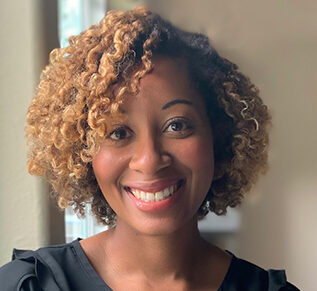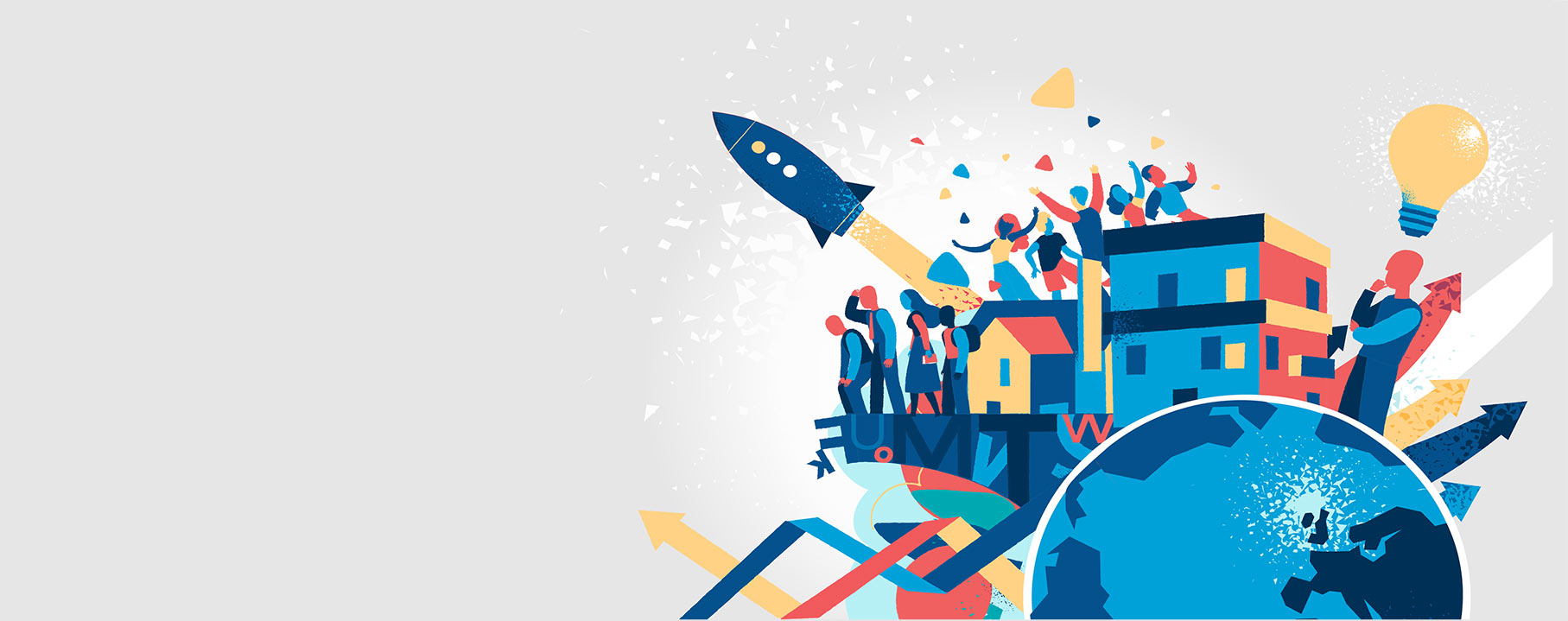What if we were deeply committed to a world that worked for all? What if instead of simply honoring the legacy of those who came before us – the ones who struggled and fought for recognition of their most basic human rights – we took our efforts a step further and decided to become good ancestors ourselves?
As a black woman born and raised in the deep South of the United States, it was disorienting to witness the sudden awareness and cultural shift sparked by the events of the last few years – in response we saw black squares fill our social media pages, anti-racism resource lists show up in our feeds and declarations of allyship from brands around the world flood the airwaves in support of Black, Indigenous, and People of Color (BIPOC).
I am in no way unfamiliar with the disrespect, disregard and danger Black people can experience in our everyday interactions. There was the time my presence in a local yoga class was questioned when none of the white women in the class were similarly approached. Or the time at a wedding reception when my table of all white retired judges and lawyers recounted the time that they “accidentally” dressed in black face at a conference. And of course, the moments when my white husband and I have been asked at a restaurant if we want one check or two when none of the other couples in our section are given that same choice. These experiences are always distressing. But in witnessing the events of the last few years, I was confronted with a host of new emotions: deep and aching sadness for yet again the tragic loss of Black lives; a surprising bout of gratitude for the BIPOC-centered spaces that gave me language for what I had experienced in my own life; and not surprisingly, intense skepticism and anger about ‘why now.’ Why was the world now convinced of my humanity? And how long before what felt like a movement toward something new and better became just a moment in time, lost to short attention spans and distraction?
If I’ve learned anything being part of the team at Realized Worth, it is to pay attention to those moments of disorientation. Those moments alert you to a new experience, presenting you with an opportunity to expand and grow.
Black History Month is a time to recognize the achievements of Black people in history and to look ahead to envision what it will take, individually and collectively, to address and heal the trauma of black communities. This means telling the truth – sharing the real history of race relations in the US and around the world through the lived experiences of those of us who identify as Black. And it means using the inherent benefits of being white or white-passing to transform communities, companies, and social systems.
Definitions and Key Concepts
Before skipping ahead to solutions, here are some key terms and concepts to help guide us toward meaningful action without perpetuating harm.
- Prejudice – an attitude, often negative and based on stereotypes, toward an individual based solely on the individual’s membership of a social group.
- Race – a social construct created to differentiate people on the basis of skin tone.
- Racial Bias – an unconscious or conscious prejudice against an individual or group based on their racial identity.
- Racism – racial prejudice enacted through systems of social and institutional power.
- Internalized Racial Oppression – the internalization of racial stereotypes, values, images and ideologies perpetuated by White dominant society about one’s racial group, leading to feelings of self-doubt, self-hate and disrespect for one’s race and/or oneself.
- White Supremacy – an ideology or collection of ideas that perceives the ideas, beliefs, norms and actions of white people as superior to the ideas, beliefs, norms and actions of people of color.
- Saviorism – the act of helping someone or a group less fortunate than you in a self-serving manner.
- Privilege – the advantage or right given over someone else; a person can either be born with privilege or gain privilege over time.
- Identity – the qualities, beliefs, personality, looks and/or expressions that make a person; there are many forms of identity including gender, race, religion, age, socioeconomic status, education level, ethnicity and sexual orientation.
And here are a few important notes on some of the terms above:
1. Race was created as a political and economic tool valuing whiteness (an idea that has changed over time to exclude and include multiple ethnic groups) and de-valuing it’s polar opposite, Blackness. The creation of race served to treat people as fundamentally different and lesser than solely based on the physical difference of skin tone. Despite race being a false concept, the lived experiences of those who are non-white is very real.
2. Racism, much like other “-isms” in society, join prejudice with power. This means in a white-dominant society, like what exists in much of the Western world, the concept of “reverse racism” does not exist. Anyone can act on their prejudices, but only the dominant majority can enact policies and erect institutions that formalize those prejudices.
3. White Supremacy has traditionally been thought of as overt, socially unacceptable forms of behavior, such as hate crimes or belonging to racist social organizations. However, sociologists consider white supremacy as an ideology that permeates our socially acceptable behaviors or ideas too, including but not limited to denying the existence of racism, participating in discriminatory hiring practices, and appropriating other cultures.
4. Saviorism often comes up in philanthropy and volunteerism whereby those with resources approach disadvantaged communities with the mindset of “saving” those communities or doing something “for” them. We are not here to save each other. Instead, we have an opportunity to share power with one another so ultimately people have the agency to care for themselves and their communities.
Many of the issues at play in our societies today are rooted in the legacy of colonization. In his book Decolonizing Wealth (a must-read for anyone managing and distributing financial resources for global good), Edgar Villaneuva characterizes colonization by the paradigm divide, control, and exploit. This paradigm continues to manifest in our institutions today, from education and housing to health care and philanthropy.
Practically speaking, colonialism occurs when one country invades and takes control of another country. The two major waves of colonialism occurred in the 15th century when European nations (Britain, France, Portugal and Spain) colonized North and South America and in the 19th century when those same European nations colonized Africa.1 During these periods of time, the native inhabitants of North America, South America and Africa were removed from their lands, brutalized, and/or forced to assimilate to European ideas and values.
White supremacy facilitated colonization and specifically worked to oppress black people, who were (and in some cases still are) viewed as inherently “slave-able;” erase indigenous people by separating them from their land, culture and identity; and make inferior or less human anyone deemed “the other.” White supremacy, coupled with internalized racial oppression, continue to uphold societal systems of oppression. These two belief systems keep us separate from one another and ultimately harm us all.
Adopting a New Narrative
But we can choose a different narrative. Sharif Abdullah beautifully articulates in Creating a World That Works for All that we can choose a different way of being. Abdullah calls the current story of our era the dominant story of “The Breakers.” He writes:
The Breaker Story, which tries hard to be the only story, has the subtitle “Creating a World that Works for Me.” This story is based on a thought, “I am separate,” and an assumption “There is not enough.” Breakers are people who live disconnected from the Earth, from local ecologies, and from all other beings. Their consciousness breaks relationships at every level of existence.
But he proposes an emerging story of “The Menders,” with the subtitle “Creating a World That Works for All.” He continues:
Their fundamental thought is “We are One,” and their guiding assumption is “There is enough for all.” Menders are functioning as the catalysts of a new society, consciously creating alternatives to Breaker excesses. As Menders, our focus is on a world greater than our individual personalities, families, or nations…We act not just for ourselves, not just for other beings currently cohabiting the Earth with us, but also for future generations…
This new story Abdullah conceptualizes is one built on reciprocity. Similarly, Edgar Villaneuva offers that to live into a newer, better paradigm we need to shift away from divide, control, and exploit and into connect, relate, and belong.
There will always be people who only choose to know and live into a story based in hyper-individualism and division. And there will always be people seeking a different story, a story that imagines what would be possible if everyone could win.
What Work is Yours to Do?
We can each take part in healing our world, beginning with ourselves and then moving outward to our families and communities. The key is to understand how best to harness your energy and resources to identify what work is yours to do.
Here are three things you can do to begin living into this new narrative.
1. Consider how your identity affects your lived experience.
Refer back to the definition of identity above. What aspects of your identity hold or confer privilege? In what ways do you experience marginalization?
This exercise is valuable because privilege can blind you from solutions that work for everyone. Exploring your identity also elucidates Dr. Kimberlé Crenshaw’s concept of intersectionality, in which your various identities affect how you show up and move through the world. If you identify as white, it’s important to understand white privilege does not mean you have not faced challenges or earned what you have accomplished. It means you have “greater access to power and resources than non-white people in similar situations do.”
Deepa Iyer’s The Social Change Ecosystem Map describes 10 different roles we can play in society and offers additional exercises you can explore as you embark on social change. If your identity is rooted in the dominant culture, these exercises are especially critical because your self-appointed or pre-assigned role in your organization or community may not be as inclusive as intended. You may also begin to recognize which other voices or perspectives you need to bring in for the greatest social impact.
2. Reflect on the two aspects of systemic racism and oppression – internalized racial oppression and white supremacy.
As you start to unpack how your identity and roles affect your life experiences, you can also begin to explore how you personally participate in upholding systemic racism/oppression.
If you identify as Black, how has internalized racial oppression shown up in your life?
If you identify as white or white-passing, how have you been complicit in (consciously or unconsciously) or benefitted from white supremacy?
Be very specific here about your personal actions or beliefs. Most Black people can recall exact incidents or moments that have reflected back to them the anti-black sentiment required for white supremacy to thrive. However, when white or white-passing people are asked this question, responses can be very general or related to someone else’s behavior. In order to open yourself to greater awareness and new ways of being, it’s really important you identify your personal actions.
3. Commit to supporting, amplifying, and paying black people, communities, and organizations.
The fact is America has a race problem manifesting as a Black economic problem. The…past began with Blacks serving as capital and evolved into a system in which whatever capital Blacks may have established, in addition to their physical bodies, was always vulnerable to state-directed or facilitated confiscation. As a result of this…Black people have very little ownership of America’s land or means of production.5
In the United States, wealth has been built on the backs of black and indigenous people. White and white-passing people committed to transforming society can use their wealth and privilege to give in ways that are respectful and responsive to that history. Those with economic power and privilege can shift power and resources to marginalized groups in profound ways.
There are a number of Black businesses, organizations, community leaders, content creators and educators working to heal black people and communities. Although many of the conversations around diversity, equity and inclusion were elevated in 2020, there were people deeply grounded in these issues and this work before last year. Seek them out, build a relationship with them and support their work by investing in them financially. This could be ordering a product you use from a black-owned business, remaking your HR practices to create pathways for black leaders at every single level of your company, or redirecting your organization’s capital resources (money, land, etc.) to support community-led funds and initiatives. Just remember, before you create a new program or initiative – regardless of how well-intentioned – investigate which, if any, BIPOC leaders are already doing that work and support them. Do not whitewash or co-op their efforts.
The Work of a Lifetime
Real, meaningful change takes time. If you are dedicated to creating a world where everyone wins, this will be the work of a lifetime. And you may start feeling like you need to become an expert before you can take action. The best way to combat that feeling is to be in relationship with people whose lived experience is unlike yours. If you identify as white or white passing and do not move beyond awareness and education toward real action, you are centering whiteness and upholding the very systems we need to dismantle. Instead of thinking you need to “give back,” consider how you can act in solidarity with marginalized communities. Ask “How can everyone become powerful?” and then move your resources in the direction of that reality. Instead of engaging communities through the lens of their challenges and struggles, begin with their strengths, identifying where there is already wholeness, passion, and joy. Then use your resources to support those efforts and leaders.
Just because you think a societal issue does not affect you does not mean you cannot be committed to creating a society in which those issues are unthinkable for others. Edgar Villaneuva calls it radical generosity: “the concept that the suffering of others should be as intolerable to us as our own suffering.”
While we may never see an end to racism and systemic forms of oppression in our lifetime, we can absolutely work individually and collectively to contribute to a world that values the humanity of us all. During this month in which we celebrate black people and culture, let’s not just honor history – let’s make it.







2 Comments. Leave new
Wonderfully articulated article. Thank you for sharing!
I have read this article numerous times and I can’t tell you how valuable I find it. Such important perspective, and I really appreciated the references to additional readings. A great call for us to make a new world. Chris